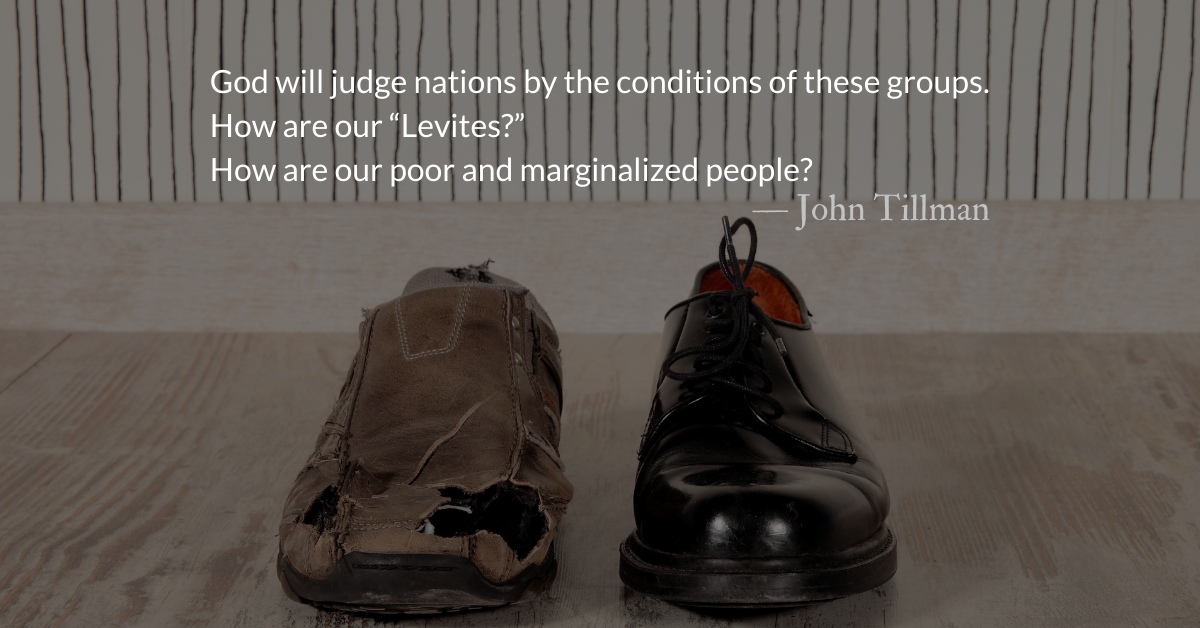Scripture Focus: Deuteronomy 14.22-23, 28-29
22 Be sure to set aside a tenth of all that your fields produce each year. 23 Eat the tithe of your grain, new wine and olive oil, and the firstborn of your herds and flocks in the presence of the Lord your God at the place he will choose as a dwelling for his Name, so that you may learn to revere the Lord your God always.
28 At the end of every three years, bring all the tithes of that year’s produce and store it in your towns, 29 so that the Levites (who have no allotment or inheritance of their own) and the foreigners, the fatherless and the widows who live in your towns may come and eat and be satisfied, and so that the Lord your God may bless you in all the work of your hands.
Reflection: Spiritual Indicators
By John Tillman
The offerings the Israelites presented served many purposes. They symbolically pointed to the future sacrifice of Christ, but they also served practical and direct functions in society.
The spiritual purpose of these offerings was to bring people into the presence of the Lord for a meal. When people worshiped at the Temple, it was a large family meal in which they and the Levites and priests ate in God’s presence. This picture reflects other meals that God ate with his people, including the elders on Sinai, the disciples with Jesus, and the coming wedding feast of the Lamb.
There were practical purposes as well. Levites had no land to support themselves. They were to focus on cultivating faith, not grain or animals. The tithes, offerings, and sacrifices were God’s provision for these families. God often would judge the condition of the nation by the condition of the priests and Levites. If they were starving and struggling, the people were being unfaithful. If they grew fat and overly prosperous (1 Samuel 2.22-36) the priests and Levites were unfaithful.
God also expected the poor and marginalized to benefit from the offerings. God holds his people responsible for the welfare of the poor, the foreigners, the widows, and the orphans. The tribal economic system was not perfect and had specific problems and abuses that commonly harmed widows and orphans. These groups represent to us people who may regularly fall through the cracks of our flawed economic systems.
As with Israel, God will judge nations by the conditions of these groups.
How are our “Levites?” Are they neglected? Are they struggling without enough financial support? Are they weighed down with demands? Are they crying out for righteousness but no one is listening?
It is simultaneously possible for Levites to become the abusers. Are they growing fat on the sacrifices? Do they abuse their followers? Are they concealing corruption and allowing abuse to continue?
How are our poor and marginalized people? Are they harassed and helpless, like sheep without a shepherd? Are they victimized and blamed for their own suffering? Are they crying out for justice but no one is listening?
These groups are spiritual indicators, testifying to the condition of the hearts of those who claim to follow God. If we expect to dine with God in fellowship, we should not be surprised to be confronted/convicted based on the condition of these groups.
Divine Hours Prayer: A Reading
Jesus said: “As long as the day lasts we must carry out the work of the one who sent me; the night will soon be here when no one can work. As long as I am in the world I am the light of the world.” — John 9.4-5
– Divine Hours prayers from The Divine Hours: Prayers for Springtime by Phyllis Tickle
Today’s Readings
Deuteronomy 13-14 (Listen – 6:35)
Psalm 99-101 (Listen – 2:48)
Read more about Christ, the True Hero
We are not the saviors, but the ones in need of saving. It is Christ, not us, who is the hero of our cities and our world.
Read more about Where Judgment Falls
Eli’s sons were corrupt in the extreme…a textbook case of spiritual abuse and financial malfeasance in the name of ministry.







